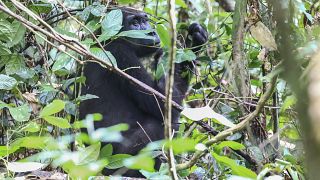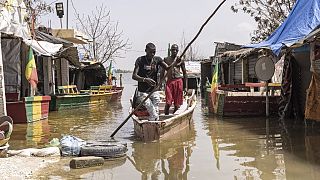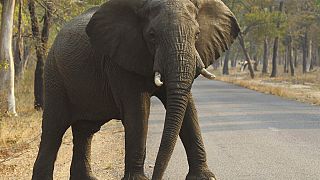Cameroon
In the south of Cameroon, the Campo Ma'an National Park has been a safe haven for wildlife for years.
The 264 064 ha forest is home to 500 plant species, 80 species of mammals including gorilla and elephants, 249 fishes, reptiles, 80 species of amphibians and over 300 species of birds.
However, the inhabitants living on the outskirts of the park are victims of animal attacks left with smaller space where to wander.
Some 20 complaints from victims in eight villages have been recorded by the conservation services of Campo Ma'an National Park, a vast primeval forest.
"The animals discourage us," Daniel Mengata laments.
"I started crying after seeing the damage because in one night, a year's work was wiped out, it hurts a lot," complains the 37-yearl-old farmer whose two-hectare plantain plantation was "devastated" in 2020.
"I can no longer feed my family," says Emini Ngono, 57, whose squash, cassava and potato farm was ravaged by elephants. According to her, she earned 700,000 CFA francs (about1,000 $) from the sale of squash seeds, which are widely consumed in Cameroon as sauces or in traditional dishes.
Reconcile wildlife-human
Nearby, logs of wood being pulled out of the forest are visible. And as the sound of a saw drowns out the birdsong, a group of trackers scour the jungle for gorillas.
Ten years ago, the World Wildlife Fund (WWF) launched a "habituation" project to familiarise a group of gorillas with human presence in order to develop ecotourism.
Part of the proceeds from the project should go to local communities with the dual aim of raising awareness of species conservation while curbing human-wildlife conflicts.
"This is Akiba," says Chimène Mando'o, 25, one of the trackers' leaders, as a primate screams.
Shortly afterwards, Akiba, which means "thank you" in Mvae, the local language, is seen at the foot of a tree, about ten metres away, before quickly disappearing into the jungle.
"We need to find a way to generate development (...) so that everyone benefits from this natural capital," hopes Yann Laurans, head of terrestrial biodiversity at WWF France.
The habituation process project aims to develop ecotourism which can generate income and to encourage inhabitants to take care of their environment.
What causes the increase of attacks?
In each of the 8 villages affected near Campo, "we have had 3 to 4 hectares of plantations destroyed, which represents a significant financial loss for the populations", Michel Nko'o, the park's administrative manager reports.
"80 to 90%" of the attacks are attributable to elephants, the rest to gorillas, chimpanzees, buffaloes, hedgehogs, pangolins and porcupines, Nko'o says.
Human-wildlife conflicts on the edge of dense forests are on the rise in Cameroon and cases of crop destruction are mainly recorded near protected animal reserves, especially in the North.
Destruction of fields " has increased significantly since the agro-industries set up shop" on the outskirts of the park, the park manager observes.
Indeed, industrial projects are flourishing around and increasing the pressure on the wildlife living there.
More than 2,000 hectares of dense, virgin forest have been razed to the ground for oil palm cultivation by an agro-industrial company, CamVert, to which Yaoundé had granted a concession for 60,000 hectares before reducing it to 39,000 ha under pressure from local NGOs.
According to the Ministry of Forests and Wildlife, Cameroonian law does not provide for compensation for victims of animal attacks in the parks.
WWF said it was "testing and studying" the possibility of an insurance system to compensate victims in case of attacks.
Mr Yomen has opted for another type of insurance: installing beehives on his plantation to repel elephants. But other solutions include "planting chilli and lemon trees that repel the pachyderms with their stings", according to Mr Nko'o.













02:55
In Cameroon, Paul Biya's candidacy divides his party
02:14
Scientists find way to identify elephant ivory disguised as legal mammoth ivory
01:51
In this Moroccan crocodile park, children learn about the environment
11:14
Rwanda Walks Away: what’s behind the Central Africa rift? [Business Africa]
01:05
Zimbabwe to cull 50 elephants, distribute meat to locals
01:12
Cameroon tops list of world's most neglected displacement crises